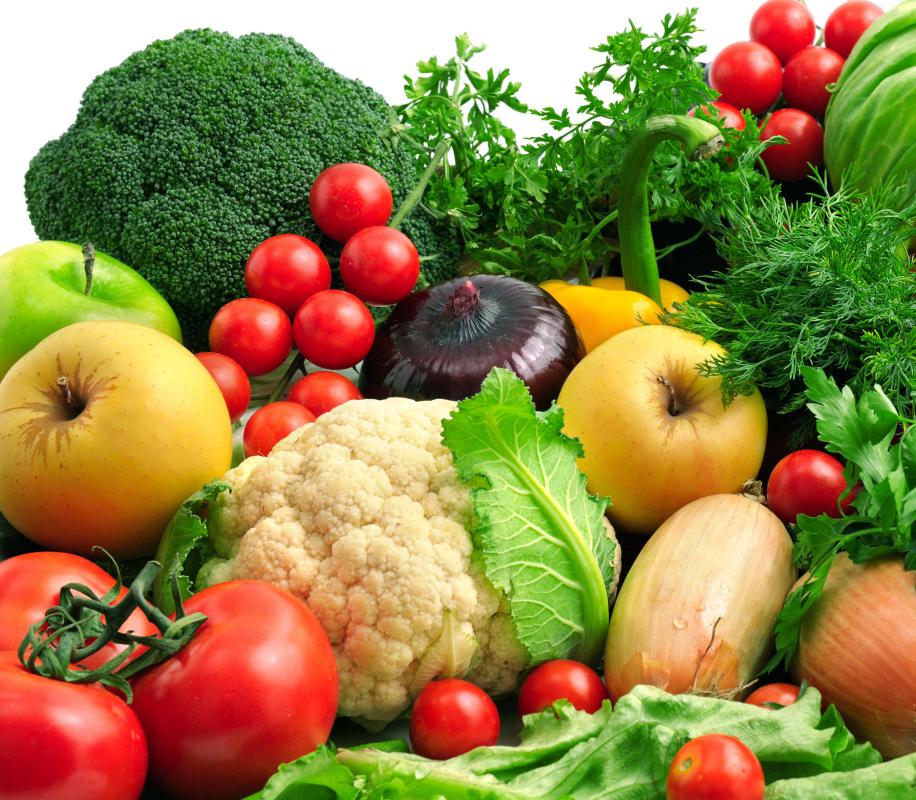At TheHealthBoard, we're committed to delivering accurate, trustworthy information. Our expert-authored content is rigorously fact-checked and sourced from credible authorities. Discover how we uphold the highest standards in providing you with reliable knowledge.
What are the Different Types of Nutritional Needs?
Various groups of people have different nutritional needs, with the primary differentiation being among people of different ages and developmental stages. Infants, toddlers, older children, adults, and the elderly all have different nutritional needs. Other groups include pregnant and lactating women and people who have certain health conditions. The most effective way of determining individual needs is to discuss nutrition with a doctor or licensed nutritionist, although there are general rules of thumb that can be followed for nutrition for each group.
Infants’ nutritional requirements are small compared to older children and adults, but they still have very specific nutritional demands. Breast milk is the healthiest and most natural food for infants because it is specially formulated for a human baby. It also contains antibodies to enhance an infant’s frail immune system in the early months, and it is easier to digest than manufactured formulas. Mothers who are unable to breastfeed can use an artificial substitute and still provide adequate nutrition for her child. Either of these options should be used exclusively for the first four to six months of age, at which point baby food can be supplemented up until the first year.

Toddlers and older children have more varied nutritional requirements to help their growing bodies develop. They require high levels of protein for muscle growth and higher fat levels than adults because fats help the brain develop more efficiently. Healthy fats are best and include things like lean meats and dairy products. Sweets and sugary snacks should be limited at any age, as well as caffeine and other stimulants. Children should avoid things like peanut butter and honey until the age of two to avoid the risk of allergies and botulism.

Adults with no health problems or other issues are generally advised to follow the food pyramid for optimum health. This includes eating plenty of high fiber whole grains, lean meats, and many vegetables. A general rule of thumb to follow to meet a healthy adult’s nutritional needs is to fill one quarter of a plate with grains, one quarter with lean meat or protein, and the remaining half with vegetables and fruit. An adult also needs to remain hydrated by drinking at least eight to ten glasses of water per day.

The elderly have special nutritional requirements due to advancing age and the greater risk of health problems. They may require greater amounts of fruits and vegetables to provide optimum immune function, as well as high amounts of fiber for increased digestion. Many older individuals do not eat enough, so healthy fats like peanut butter and olive oil, as well as nutritionally dense foods like spinach, should be chosen.

Pregnant women have unique nutritional needs as well, including increased folic acid intake and an additional 300 calories per day when compared with a non-pregnant woman. Breastfeeding women should increase food intake to an additional 500 calories per day and to consume adequate fluids to maintain a healthy milk supply. Both groups may need to consume higher amounts of protein, iron, and calcium to restore supplies being depleted by the growing baby.

Those with illnesses may have special nutritional requirements, but this will vary based on the illness and individual. Special diets and supplements may be needed, and should be discussed with the patient’s doctor. If no special diets are required, patients should eat foods high in antioxidants and immune boosting properties, as well as the foods listed for healthy adults.
AS FEATURED ON:
AS FEATURED ON:


















Discussion Comments
@abundancer -- I go through this with my teens as well. Something we have done is to include them in the grocery shopping.
We usually insist that they have breakfast. I buy their favorite fruits and we make smoothies for breakfast. This is fast and easy, and they love that they can take it on the go if we are running late.
They usually have lunch at the high school, so I always make sure they have healthy afternoon snacks. This could be another smoothie if they like, or almonds, fruit, or even their favorite veggies and a dip.
By allowing them to pick out the fruits and veggies, I know that they will eat them. I can't keep grapes in the house!
So, even if they are on a binge of eating once or twice a day, I try not to worry because at least I know it's healthy.
I also make sure they take a healthy whole food multi-vitamin made especially for teens.
I go back and forth on my teenager's nutritional needs. They constantly go from eating me out of house and home one month to barely eating anything the next.
Is this normal for teenagers? And if so, how can I make sure they are getting the proper nutrition during the times they hardly eat?
Any suggestions would be helpful!
Post your comments